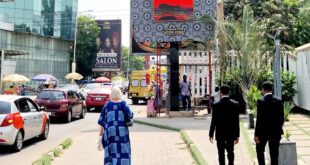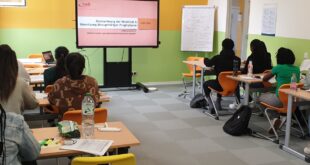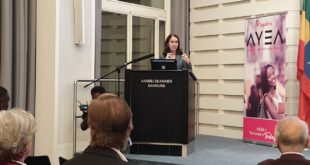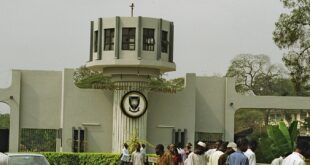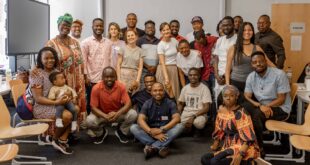Hon. Abike Dabiri-Erewa, Chairman/CEO, Nigerians in Diaspora Commission (NIDCOM), has called on Nigerian parents to stop sending their children to study in Northern Cyprus.
She made the call in Abuja on Monday while speaking on the sudden death of a 25-year-old Nigerian student in Northern Cyprus, Mr Ibrahim Khaleel Bello, and others who had died in similar mysterious circumstances in the country in the past.
Dabiri-Erewa made the passionate plea while playing host to Hon. Justice Amina Ahmad Bello, a Judge in the Kaduna State High Court, who had come to complain about the mysterious and unexplainable death of her son Ibrahim, a third year civil engineering student at the Girne American University in Girne (Kyrenia), Turkish Republic of Northern Cyprus.
Dabiri-Erewa called on parents to be weary of sending their wards to Northern Cyprus, whose inhabitants number just over 300,000, given the many cases of Nigerian students who had died mysteriously in the country without any convincing official explanations for their deaths.
The NIDCOM chief also explained that Nigeria had no diplomatic ties with Northern Cyprus, a self-declared republic that is not recognized by the United Nations or other countries except by Turkey.
Dabiri-Erewa assured Justice Bello that NIDCOM would work with the Federal Ministry of Justice, the Nigerian Embassy in Turkey and other relevant agencies to ensure justice was done, saying “the death of Ibrahim Khaleel Bello should be a tipping point to end the continuous killing of Nigerian students in that country”.

“The time has come for us to blacklist all these universities in Northern Cyprus and advise our students from seeking any form of admission there as it portends danger to their life and future,” she added.
Dabiri-Erewa announced that the office of the Attorney General of the Federation had already reported the death of Khaleel to Interpol for further investigation.
Earlier in an emotion-laden voice, Justice Amina Ahmad Bello, mother of the deceased, said her insistence on justice was not only for her son but also other Nigerian students who had died mysteriously at the Girne American University Girne and other universities in Northern Cyprus.
She narrated how her son’s death was covered up by the government of Northern Cyprus as well as by the university authorities, who claim that Khaleel committed suicide as he had allegedly fallen from a seven-storey building.
Mrs Bello insisted there was nothing to show that her son committed suicide, calling on the Nigerian government to investigate the report of the Northern Cypriot authorities and ensure that anybody found culpable in her son’s death to be prosecuted.
READ ALSO Canada announces express visa scheme for Nigerian students
The high court judge said she spoke with her son hours before his death and he expressed fears for his safety in the university environment.
Justice Bello further revealed that Khallel had sent her a WhatsApp message saying “Mama, Please I want to come back home. Wallahi if I stay here, I will just die here without anybody batting an eyelash. I just need to come back home. Mama please try to understand that this isn’t a place for me”.
The bereaved mother said: “I don’t believe it was an accident or a suicide as I went to Cyprus barely 24 hours after it happened and got to the mortuary where there was no scratch or wound on his body.
“I suspected foul play that my son was killed as the school was non-challant in breaking the news to me on my arrival there.”
She alleged that it was possible that the vital organs of some of the Nigerian students who died in Northern Cyprus were harvested as her son’s stomach was opened and sutured when the corpse was finally released to her.

The late Ibrahim Khaleel Bello is the latest among about 100 Nigerians who have died in mysterious circumstances from 2016 to 2020 without the authorities prosecuting any of the assailants.
Among those whose death in Northern Cyprus has been brought to the notice of the Nigerian government and are suspected have been murdered are Kennedy Taomwabwa Dede, student of Eastern Mediterranean University who was found dead on 1 February 2018; Walshak Augustine Ngok, a student of Marine Engineering at Near East University, who died on 19 April 2019.
Others were Gabriel Soriwei, a first-year student of Electrical & Electronics engineering at the Cyprus International University, Nicosia; and Osabanjo Adeola Owoyale, 33, who went missing and were found dead on 1 July 2019.
The list also includes Augustine Wallies, Stanley Eteimo, 28, Hassan Babatunde, 28, Temitayo Adigun, Kubiat Abasi, Abraham Okon, 24, Oziegbe Gospower Airekugose and Olasubomi Ope, among others.
READ ALSO Germany most popular non-English speaking country for foreign students
Northern Cyprus, officially the Turkish Republic of Northern Cyprus, comprises the northeastern portion of the island of Cyprus. Recognised only by Turkey, the country is considered by the international community to be part of the Republic of Cyprus.
The higher education sector has been described as one of the “engines” of the Turkish Cypriot economy and has “grown in an uncontrolled fashion in the last decade as one university after another opened its doors to a flood of overseas students”.
Northern Cyprus has 19 universities, most of which are private, with the number of foreign students estimated at about 35,000 last year. Some 20,000 of the foreign students are from African countries, mostly Nigeria.
Many Nigerians study abroad because parents believe that foreign education will enable their wards escape the problems of the country’s tertiary education system, such as frequent strikes by lecturers leading to disruption of academic activities. Northern Cyprus has become attractive in the past ten years because its institutions charge lesser fees than universities in Europe and North America and their admission criteria are also deemed easier.
Adira Kallo
READ ALSO A quick introduction to studying in Germany for foreigners
 THE AFRICAN COURIER. Reporting Africa and its Diaspora! The African Courier is an international magazine published in Germany to report on Africa and the Diaspora African experience. The first issue of the bimonthly magazine appeared on the newsstands on 15 February 1998. The African Courier is a communication forum for European-African political, economic and cultural exchanges, and a voice for Africa in Europe.
THE AFRICAN COURIER. Reporting Africa and its Diaspora! The African Courier is an international magazine published in Germany to report on Africa and the Diaspora African experience. The first issue of the bimonthly magazine appeared on the newsstands on 15 February 1998. The African Courier is a communication forum for European-African political, economic and cultural exchanges, and a voice for Africa in Europe.




